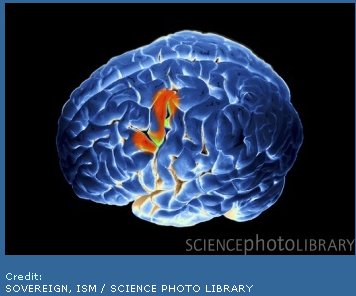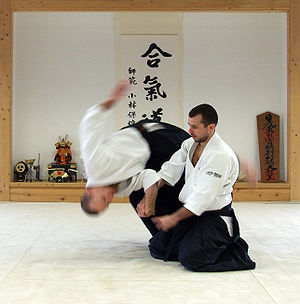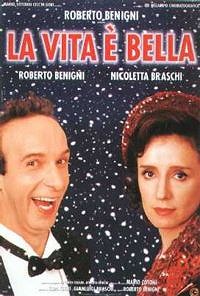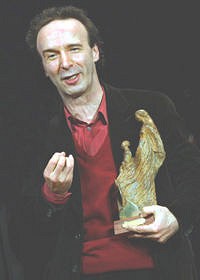...you fill in the blank.
Most "serious" film critics consider "reality" a gritty, tough, downer drama.
As if, in the
real world there are no laughs, no high points, no fun, no hope, no promise, not a glimmer of a brighter side, no light at the end of the tunnel - only gloom, doom and disaster.
Only worlds in which characters we are lured to care about suffer loss, loneliness, abuse, self-destruction, grief, beatings, arguments, drug addiction, misery and title credits-to-
fin strife.
Mind you, even in the most dire of circumstances, in *real* life, we find something to laugh about. Journalists, doctors, nurses, soldiers and others who deal with life and death every day always find something about which to laugh - although in many cases it may not be politically correct because it's usually a "dark humored" way to release the tension of the moment.
I'm not saying every dramatic film needs a laugh or two - although that would actually be more "real."
But there should be at least the minimal understanding in the industry that "serious" films can also be comedies.
Artistically, screwball comedies are the toughest work for an actor. The range is great, the circumstances unusual, the interpretive beats are counted in the hundreds - whereas a serious drama's interpretive (
subtextual, emotional) beats can be relatively few by comparison for the average drama.
This is not to dismiss a great dramatic performance in any way - good acting is hard work for any dedicated performer.
But imagine your favorite dramatic actor being in a comedy. How would he or she make the transition?
Could he or she make the transition? It takes guts. Comedy is hard - writing, performing and directing - to make it work.

Mercifully, Kate
Winslet - someone with whom I hope to work one day - says she's near desperate to be in a good comedy after playing two seriously tortured, self-destructive roles that won her many well-deserved kudos and awards, including the coveted Oscar.
She will bring the same extraordinary, award-winning brilliant talent and massive skills to a comedic character. But she'll have more fun and have to work even harder because great comedic performances demand it. I believe she is a superbly gifted comedic actor. She was hilarious in
TV's Extras, and needs a great comedic script to devour!
There are so many different types of comedy - the best, the most intelligent, has anger at its core, but diminishes the power of whatever makes us angry by putting the subject on its ear so we can all laugh about it.
In THE WHOLE TRUTH, it's the injustice of the American "justice" system. I think that pisses off nearly everyone. It certainly does me - enough to produce, write and direct a screwball comedy about the subject embodied in the lead character of Angela Masters, brilliantly played by Elisabeth
Röhm. Originally, I started writing it as a drama,
ala Michael Clayton.
But I love to entertain audiences, and who would want to sit through that morose bit more than once? Also, we feature filmmakers must devote at least a year of our lives living with these characters and plot twists and turns. Myself? I'd much rather have fun and laugh through the excruciatingly detailed process.
Actually I start all my comedies by writing the "serious" and "real" dramatic logical story, with psychological profiles and backgrounds of the lead characters. Then I flip everything into comedy.
Of course, there are those who believe film should reflect the reality of the difficulties faced by millions of our sisters and brothers around the world. That is absolutely fine with me.
But!
There's a 1941 Preston
Sturges film called "Sullivan's Travels." It's about a film director, famous for doing comedies, who decides to do a
nitty, gritty, pity drama about how shitty it is out there. To understand just how bad it is, he takes off - without a cent - to find and live with the despondent, miserable and heartbroken "common man."
Long story short - and worth watching - he ends up living with a group of these depressed, disillusioned and destitute folks.
And guess what he discovers they want more than anything?
To. Laugh.
They don't want to see more of the grief they are living.
As he watches a film with them, he sees these former sad sacks lost in laughter, enjoying the socks off a silly cartoon.
He finally realises: he is doing something that actually helps them. That they genuinely want. Something needed in any culture. To laugh, no matter how dire a circumstance.
But I digress.
"Reality."
When I coached actors, we'd role play the all-important casting interview. This is an interview conducted by casting directors or directors intended to gain insight into the actor. It's thought the more open they are, the more intimacy they give their performance. Likewise, the more insightful their answers, the more insight it is believed they'll give their characters.
One of the questions I like to ask: "Tell me about something you'd like to do over again if you could."
Literally 100% of the answers revolved around a mistake they made they'd love to rectify, that they hurt someone and want to take it back for a do-over, take school more seriously instead of blowing it off, tell someone they loved them when they had the chance .. you get the idea.
Finally, a little dismayed by years of never seeing a totally different way to answer the question, I started giving them another type of answer idea, which made them light up, show a ton of subtext and far more personality than their "serious" answers ever did.
We (directors, producers, casting agents) like to be surprised. To see something we weren't expecting.
Here's what I told them: "Instead of going the way of regret, why don't you take the enjoyable route?"
As in:
"Wow. What I'd love to do over... You know, I'd really love to re-live my weekend skiing with my girlfriend at Whistler Mountain. It was amazing. We played all week-end. Skiing, snowboarding, throwing snowballs, building a snow 'person' -- boobs and what have you. The meals were fantastic and we even had a fireplace in our room. Where we built a fire of our own, if you know what I mean. It was the best. I'd love to re-live that weekend; do it all over again."
If you want to make it super real, add that you broke up when you got home fighting over who the better skier is - or whatever really happened. If you broke up.
Or maybe that you got married - and never went skiing again.
Or maybe you got married and actually lived happily ever after.
Whatever really happened.
At the end of shooting THE WHOLE TRUTH, one of our lead actors had to rush off to do another film - which was not going to be fun. It was going to be rushed and working with a not-so-well written script, but for good money.
Like other actors on the production, s/he said it was the most enjoyable production and most difficult work they'd ever done, and was very sad to leave.
His/her parting words: "Well. Back to reality."
I said, "Working on THE WHOLE TRUTH was also reality."
There are different types of reality.
Happiness is just as much a reality as sadness as pushing through the crap out there every day.
As for me, when I realized this? I became much happier.
Seriously, I decided my reality was going to be positive, happy, fun and make the most of whatever the world handed me. A sense of humor is a valid value and personality trait, too, ya know.
That was many years ago.
So far, so good.
Labels: comedy, drama, Elisabeth Röhm, happiness, Kate Winslet, Preston Sturges, reality, Sullivan's Travels, The Whole Truth screwboall comedy feature





 The US is the only nation in the world that defines "
The US is the only nation in the world that defines " People for whom happiness is a true goal live with the intent to be happy, they pay attention and figure out ways they can help themselves live happily where they are and in their circumstances and they take action, step by step, learning how to be or become happy most of the time.
People for whom happiness is a true goal live with the intent to be happy, they pay attention and figure out ways they can help themselves live happily where they are and in their circumstances and they take action, step by step, learning how to be or become happy most of the time.
